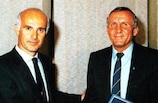Developing football in Bulgaria
Article summary
Bulgaria's new generation can aspire to the standards set by the 'Golden Generation' of 1994.
Article top media content

Article body
Overview
In 2022, for the first time in the nation’s history, Bulgaria made it to the UEFA European Under-17 Championship: an immensely symbolic achievement as the Bulgarian Football Union (BFU) aims to overcome infrastucture issues and offer the best possible environment for young players to thrive.
Shortcomings in facilities, especially in the bigger cities, are a notable issue, but the BFU’s main strategic goals are:
- Embedding world-class organisational behaviour to ensure the federation performs well in its commercial endeavours, communication and marketing campaigns and football governance.
- Growing every aspect of the game through the development of an innovative and joined-up grassroots pathway.
- Working with Bulgaria’s clubs and competition organisers to ensure the sport is accessible inspirational and continuing to grow.
With the help of UEFA’s Women's Football Development Programme, the BFU are expanding horizons for female players. Some 30 coaches now employed to support girls’ teams at U11, U13, U15 and U17 levels, while a 16-tea, women’s national league is up and running. The BFU is also targeting girls aged 8-12 through its grassroots work as it seeks to expand the women’s game.
"We will build on our existing foundations and areas of strength, whilst at the same time introducing new innovations across all areas of our sport. Through our strategy, we will combine our continual ambition to deliver international success with a broad and inclusive approach to ensuring football embeds itself as the most welcoming, accessible and progressive sport in Bulgaria. Through our work, we will increase opportunities to play, improve our footballing infrastructure, develop our workforce and ensure our competitions provide the right platform to develop our talent."
Borislav Mihaylov, BFU president
UEFA support
UEFA HatTrick funding helped to build the complex that houses the BFU’s headquarters and national training centre, and is backing investment in footballing infrastructure all over the country, with artificial pitches being laid to give young players better conditions to train and play. UEFA projects are supporting the expansion of women’s football, while social integration projects are helping children deprived of parental care as well as those with learning disabilities.
UEFA Foundation for Children in Bulgaria
Set up in 2015, the UEFA Foundation uses football as a vehicle to help improve children’s lives by supporting hundreds of campaigns and projects across Europe and around the world.
Sport and play for inclusion and integration
With UEFA Foundation for Children support, World at Play is working in the Harmanli and Sofia areas to build relationships between young locals and young refugees. Initially working with them in separate groups, it is integrating them into each other’s games and showing how, through the power of sport and play, individuals can engage with one another with respect and care as equals, regardless of gender, ethnicity and background.
Timeline
Association history
National team history
President
Georgi Ivanov
Nationality: Bulgarian
Date of birth: 2 July 1976
Association president since: 2024
General secretary
Andrey Petrov
Nationality: Bulgarian
Date of birth: 9 November 1988
Association chief executive director since: 2024










